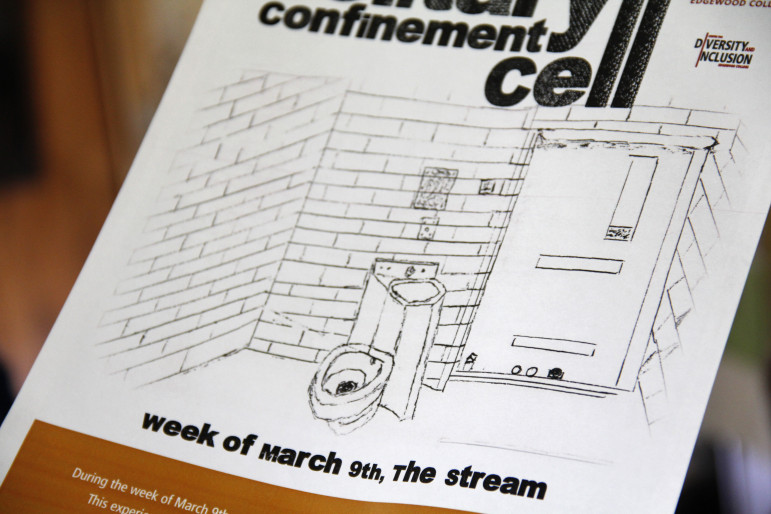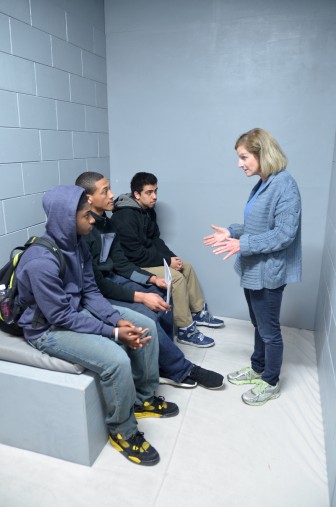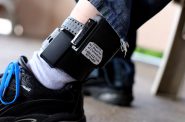Wisconsin Curbs Solitary Confinement
State joins national reform movement, but prisoner advocates say more could be done.
Lawsuits prompt improvements
Solitary confinement has come under increasing criticism as studies have shown it can cause lasting mental damage and does not improve prison safety.
Wisconsin is among at least 10 states that have adopted changes related to solitary confinement in recent years as controversy and the number of lawsuits over the practice have grown.
President Obama in July announced he had ordered the Department of Justice to study the overuse of solitary confinement in U.S. prisons.
Some prisoners and their advocates say any prolonged use of solitary confinement amounts to cruel and unusual punishment, which is prohibited under the Eighth Amendment to the U.S. Constitution. In June, U.S. Supreme Court Justice Anthony Kennedy essentially invited plaintiffs to bring a case so the high court can decide the question once and for all.
Over the past 12 years, the state Department of Corrections has eased conditions for prisoners in solitary confinement, some in response to lawsuits, according to a 2014 DOC report released to the Center as part of its settlement.
About five years ago, also in response to litigation, DOC replaced frosted glass with clear glass at some prisons, reduced the glow of night lights, allowed inmates “to cover their eyes,” provided warmer clothes and equipment including Hacky Sacks and basketballs for outside recreation and offered some out-of-cell programming to prisoners in restrictive housing, according to the DOC report.
In 2014, the 7th Circuit U.S. Court of Appeals covering Wisconsin found that at times, the conditions under which John Townsend, a mentally ill Green Bay Correctional Institution inmate, was held in the prison’s restrictive housing unit “did not meet the Eighth Amendment’s standard for the minimal civilized measures of life’s necessities.”
According to meeting agendas of the DOC’s Restrictive Housing Workgroup obtained by the Center, Townsend’s case and one brought by inmate Joseph Jiles are forcing the DOC to reconsider behavior action plans in which disruptive inmates can be kept indefinitely in isolation until they behave.

Talib Akbar’s drawing of his cell at the Wisconsin Secure Program Facility in Boscobel is a model for the mock solitary confinement cell created by Wisdom, a statewide faith-based group that has been pushing to end solitary confinement. Akbar, who served 20 years for sexual assault, spent 360 days in solitary, including several months at the Boscobel prison, for allegedly filing a false report with state regulators complaining that a prison nurse had neglected his medical needs. Akbar insists the report was true. Photo by Kate Golden of the Wisconsin Center for Investigative Journalism.
Townsend, who has post-traumatic stress disorder and was suicidal, said he was confined for months in isolation during which “his possessions were limited to a blanket, a smock and a book.” He told the court that for most of his 259 days in solitary, he was not allowed sheets or a pillow. Townsend told the judges that cold air forced him to walk nonstop around his cell to keep warm.
According to his lawsuit, Townsend was allowed just one hour per week outside his cell to read mail and write letters, and he was often denied necessities including toilet paper, soap, toothpaste and a toothbrush. Access to writing and reading materials was “severely restricted” and “for a period of weeks (he does not specify how many), Townsend was entirely naked and provided with no clothing, bedding, linen, mattress or shoes,” the court wrote.
Although the 7th Circuit found the conditions at Green Bay at times violated the Eighth Amendment, Townsend’s lawsuit will not be the test case sought by Justice Kennedy. The DOC agreed to pay Townsend $26,875 as part of a settlement reached in December in which the agency denied any wrongdoing. Milwaukee attorney Dillon Ambrose said his firm handled the case for free.
The Jiles lawsuit, brought in 2014, is still pending.
Jiles charges in his handwritten complaint in the U.S. District Court in Milwaukee that he potentially suffered from “acuted (sic) psychosis” in 2005 and was repeatedly “shuffled” among solitary confinement units at Green Bay, Columbia and Waupun correctional institutions as a “problematic inmate,” engaging in numerous acts of self-harm and “bizarre behaviors.” He alleges prison officials did not treat him for his mental illness and instead employed increasingly severe disciplinary measures to bring him into line.
In the lawsuit, the conditions he describes during a stint at Green Bay are extreme — and similar to those described by Townsend, who was also confined at Green Bay.
“Often, rather than treat plaintiffs (sic) mental illnesses, defendants would confine him, naked, to in (sic) empty cells where, for days and weeks, he would be left with no property, no reading materials, no mail, visits, telephone calls, forced to eat items ranging from oatmeal to jello with his finger and from a wet soiled bag,” according to the lawsuit.
“Consequently, because of the enforced monotony and lack of treatment, plaintiff would further decompensate and commit more self-harm.”

The statewide faith-based group, Wisdom, commissioned construction of this mock-up of an isolation cell for its campaign against solitary confinement. Here, Wisdom volunteer Jane Miller talks with students visiting the cell at Marquette University in March. Photo by Lauren Fuhrmann of the Wisconsin Center for Investigative Journalism.
Many inmate lawsuits, especially those filed without a lawyer, are dismissed. In the Jiles case, however, U.S. District Judge Rudolph Randa has ordered that he be represented by an attorney, and Randa has offered to find one to work on Jiles’ case for free.
According to the court docket, no attorney has yet been located for Jiles, now held at the Wisconsin Resource Center, a prison for the mentally ill.
Tide turning against solitary
The harsh treatment described by Townsend, Jiles and in the Center’s 2014 investigation of the Waupun segregation unit appears to be losing support from the public — and the Department of Corrections. In a 2014 memo, Secretary Wall told DOC staff he was launching an effort to retool how the agency uses isolation.
Wall wrote that simply locking inmates in segregation without providing corrective or rehabilitative programming “may really just be helping to create a worse behavior problem and habitual threat.”
In another sign of change, the Boscobel institution, opened in 1999 and previously dubbed “Supermax,” has been converted from an all-solitary confinement prison for the “worst of the worst” to one having half general population beds. The original purpose of the prison, Jess said, “is not there anymore.”
Edwards said she remains skeptical that DOC will be able to change its approach so quickly or dramatically. But over the past year, Edwards said she has heard from prisoners who felt correctional officers were less likely to seek harsh punishment for infractions.
She recalled an incident in which a prisoner she knows well resorted to holding another inmate down to avoid a fistfight. Both were pepper-sprayed, Edwards said, and “hauled off to seg.” Prison videotape backed up her contact’s side of the story.
“In the past, both men would have gotten an automatic 360 for fighting,” Edwards said. “In this case, he was only given 30 days loss of rec, and his comment to me was, ‘They’ve never shown me that kind of love.’ ”
The Wisconsin Center for Investigative Journalism’s reporting on criminal justice issues is supported by a grant from the Vital Projects Fund. The nonprofit Center (www.WisconsinWatch.org) collaborates with Wisconsin Public Radio, Wisconsin Public Television, other news media and the UW-Madison School of Journalism and Mass Communication. All works created, published, posted or disseminated by the Center do not necessarily reflect the views or opinions of UW-Madison or any of its affiliates.
Article Continues - Pages: 1 2
Cruel and Unusual
-
Jail Fees Can Leave Inmates in Debt
 Oct 4th, 2019 by Izabela Zaluska
Oct 4th, 2019 by Izabela Zaluska
-
Rules Violations Cause 40% of Prison Admissions
 Jul 3rd, 2019 by Izabela Zaluska
Jul 3rd, 2019 by Izabela Zaluska
-
Evers Faces Hurdles to Cutting Prisons
 Jul 1st, 2019 by Izabela Zaluska
Jul 1st, 2019 by Izabela Zaluska






















How about spending money on kids reading and fixing neighborhoods, stopping crime instead of trolleys and arenas.